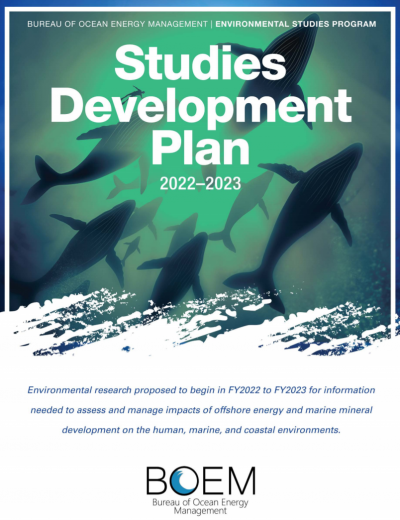As part of the Bureau of Ocean Energy Management’s (BOEM) commitment to acquire and use the highest quality scientific information in its decision making, the bureau has released its FY 2022-2023 Studies Development Plan (SDP).
The SDP is a key component of BOEM’s rigorous planning, review and procurement process to meet the nation's research needs for Outer Continental Shelf (OCS) environmental assessments. BOEM’s Environmental Studies Program (ESP) prepares the annual SDP to cover a two-year planning period. The plan outlines BOEM’s research priorities and includes brief study profiles that describe proposed studies for the upcoming fiscal year and for one successive year. These studies are designed to collect the information necessary to meet the needs of the users, including BOEM scientists, rule writers, modelers, and decision makers. Proposed studies are evaluated for program relevance, programmatic timeliness, and scientific merit.
BOEM’s Meeting with the National Academies
Committee on Offshore Science and Assessment
July 9 and 12, 2021
On July 9 and 12, 2021, the National Academies of Sciences, Engineering, and Medicine (NASEM) will hold the 16th meeting of the BOEM Standing Committee on Offshore Science and Assessment (COSA) to showcase and provide feedback on BOEM’s recently released FY 2022-2023 Studies Development Plan (SDP). The meeting will be an online event open to media and the public. The Academies require advance registration. Meeting details, including a webcast link, will be posted to the NASEM website.
BOEM has selected 12 study profiles to present to COSA:
Alaska Region
- Collaborative synthesis to understand the impacts of vessel presence and sound on the marine environment and subsistence activities in the Pacific Arctic, Catherine Coon
- Using Multiple Tools to Assess Marine Mammal Distribution, Numbers, and Habitat use in Cook Inlet, Christina Bonsell
Gulf of Mexico Region
- Study of Plastic Pollution from Abandoned Umbilicals in the Gulf of Mexico (GOM), Sarah Vaughn
Marine Minerals Program
- Electromagnetic Survey Techniques to Locate and Identify Sediment for Coastal Restoration, Jeffrey Waldner*
- In Situ Sampling of an Historic Seabed Mining Site on the Blake Plateau, Michael Rasser*
Office of Environmental Programs
- BOEM-Tribal Collaboration: Understanding Maritime Environments on the Atlantic Coast, John Primo and Justin Bedard
- Understanding Impacts of Habitat Modifications on Commercial Fisheries and Apex Predator Distribution, Jacob Levenson
Office of Renewable Energy Programs
- Clam Industry Spatial Needs Analysis – NY Bight, Brian Hooker
- Coastal Landscape/Seascape Character Classification and Assessment Methodology Development, John McCarty
- Exploring the connectivity between offshore wind turbines, Mary Boatman
- Offshore Wind Impacts on Oceanographic Processes: North Carolina to New Jersey, Jennifer Draher
Pacific Region
- Ancient Landscapes off the Washington Coast, David Ball
* Not included in the FY 2022-2023 SDP
BOEM consults with COSA as a source of independent, scientifically credible and objective information on topics of interest for the environmental studies and assessment activities. Collectively, these inputs contribute to the development of research plans.
BOEM’s Environmental Studies Program develops, funds, and manages rigorous scientific research specifically to inform policy decisions on the development of energy and mineral resources on the Outer Continental Shelf. Research covers physical oceanography, atmospheric sciences, biology, protected species, social sciences and economics, submerged cultural resources and environmental fates and effects.


